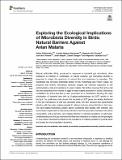Por favor, use este identificador para citar o enlazar a este item:
http://hdl.handle.net/10261/278822COMPARTIR / EXPORTAR:
 SHARE SHARE
 CORE
BASE CORE
BASE
|
|
| Visualizar otros formatos: MARC | Dublin Core | RDF | ORE | MODS | METS | DIDL | DATACITE | |

| Título: | Exploring the ecological implications of microbiota diversity in birds: Natural barriers against avian malaria |
Autor: | Palinauskas, Vaidas; Mateos-Hernández, Lourdes CSIC ORCID; Wu-Chuang, Alejandra; Fuente, José de la CSIC ORCID ; Aželytė, Justė; Obregón, Dasiel A.; Cabezas-Cruz, Alejandro CSIC ORCID | Palabras clave: | Anti-α-Gal antibodies Avian malaria Gut microbiota Transgenerational immunity Protective immunity |
Fecha de publicación: | 2022 | Editor: | Frontiers Media | Citación: | Frontiers in Immunology 13: 807682 (2022) | Resumen: | Natural antibodies (Abs), produced in response to bacterial gut microbiota, drive resistance to infection in vertebrates. In natural systems, gut microbiota diversity is expected to shape the spectrum of natural Abs and resistance to parasites. This hypothesis has not been empirically tested. In this ‘Hypothesis and Theory’ paper, we propose that enteric microbiota diversity shapes the immune response to the carbohydrate α-Gal and resistance to avian malaria. We further propose that anti-α-Gal Abs are transmitted from mother to eggs for early malaria protection in chicks. Microbiota modulation by anti-α-Gal Abs is also proposed as a mechanism favoring the early colonization of bacterial taxa with α1,3-galactosyltransferase (α1,3GT) activity in the bird gut. Our preliminary data shows that bacterial α1,3GT genes are widely distributed in the gut microbiome of wild and domestic birds. We also showed that experimental infection with the avian malaria parasite P. relictum induces anti-α-Gal Abs in bird sera. The bird-malaria-microbiota system allows combining field studies with infection and transmission experiments in laboratory animals to test the association between microbiota composition, anti-α-Gal Abs, and malaria infection in natural populations of wild birds. Understanding how the gut microbiome influences resistance to malaria can bring insights on how these mechanisms influence the prevalence of malaria parasites in juvenile birds and shape the host population dynamics. | Versión del editor: | https://doi.org/10.3389/fimmu.2022.807682 | URI: | http://hdl.handle.net/10261/278822 | DOI: | 10.3389/fimmu.2022.807682 | E-ISSN: | 1664-3224 |
| Aparece en las colecciones: | (IREC) Artículos |
Ficheros en este ítem:
| Fichero | Descripción | Tamaño | Formato | |
|---|---|---|---|---|
| explormalar.pdf | 4,03 MB | Adobe PDF |  Visualizar/Abrir |
CORE Recommender
SCOPUSTM
Citations
7
checked on 18-abr-2024
WEB OF SCIENCETM
Citations
6
checked on 29-feb-2024
Page view(s)
32
checked on 23-abr-2024
Download(s)
49
checked on 23-abr-2024
Google ScholarTM
Check
Altmetric
Altmetric
Este item está licenciado bajo una Licencia Creative Commons

